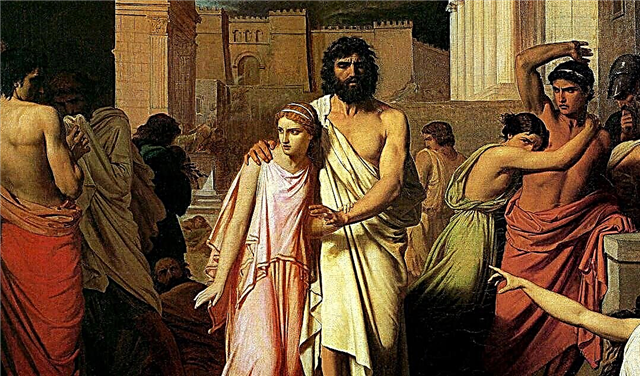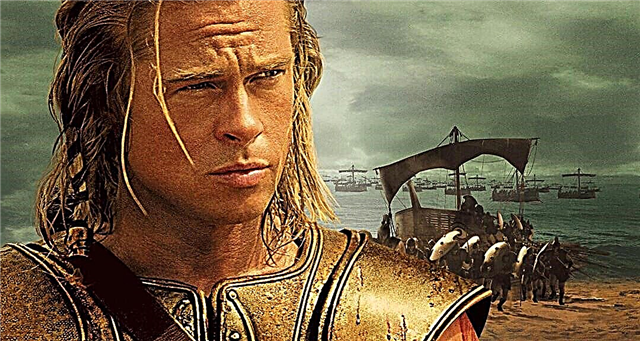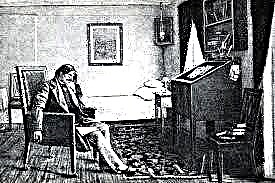A young American with the biblical name Ishmael (Genesis says of Ishmael, son of Abraham: “He will be between people like a wild donkey, his hands on everyone and everyone’s hands on him”), bored by being on land and having difficulty in money, he accepts the decision to sail in a whaling ship. In the first half of the XIX century. The oldest American whaling port of Nantucket is already far from the largest center of this industry, however, Izmail considers it important for himself to board a ship in Nantucket. Stopping on the way there in another port city, where it’s not out of the ordinary to meet a savage who has replenished a team of a whaler on unknown islands, where you can see a buffet counter made of a huge whale jaw, where even a preacher in the church rises to the pulpit on a rope ladder - Ishmael listens to a passionate sermon about the prophet Jonah, absorbed in Leviathan, who was trying to avoid the path that God had appointed him, and met a native Harpooner Quiqueg at the hotel. They become bosom friends and decide to enter the ship together.
In Nantucket, they are hired by the Pecode whaler, preparing to go on a three-year round-the-world voyage. Here Ishmael learns that Captain Ahab (Ahab in the Bible is the wicked king of Israel, who established the cult of Baal and persecuted the prophets), under whose leadership he will go to sea, in his last voyage, having fought with a whale, lost his leg and has not left since from sullen melancholy, and on the ship, on the way home, he even stayed out of his mind for some time. But Izmail does not yet attach importance to this news, or to other strange events that make him think of some secret connected with the Pekod and his captain. He sees a stranger who has embarked on obscure but formidable prophecies about the fate of a whaler and everyone enrolled in his team, he takes for a madman or a scammer. And the dark human figures, at night, secretly, climbed the Pekod and then seemed to dissolve on the ship, Ishmael is ready to consider it a figment of his own imagination.
Only a few days after sailing from Nantucket, did Captain Ahab leave his cabin and appear on deck. Ishmael was struck by his gloomy appearance and the inescapable inner pain imprinted on his face. Holes were drilled in advance in the boards of the decking so that Ahab could, by strengthening a bone leg made of polished sperm whale jaw in them, keep his balance while heaving. Observers on the masts were ordered to vigilantly look out for a white whale in the sea. The captain painfully closed, even stricter than usual requires unquestioning and immediate obedience, and sharply refuses to explain his own speeches and actions even to his assistants, whom they often cause bewilderment. “The soul of Ahab,” says Ishmael, “hid in the harsh blizzard winter of his old age and hid in the hollow trunk of his body and sucked a gloomy paw of darkness there.”
For the first time, Izmail, who went to sea on a whaler, observes the features of a fishing vessel, his work and life on it. The short chapters that make up the whole book contain descriptions of the tools, techniques, and rules for hunting a sperm whale and extracting sperm from his head. Other chapters, “cinematic” - from the pre-sent book of a collection of references to whales in a wide variety of literature to detailed reviews of the whale's tail, fountain, skeleton, finally, bronze and stone whales, even whales among the stars - throughout the novel supplement the narrative and merge with it, telling events a new, metaphysical dimension.
One day, on the orders of Ahab, the Pecoda team gathers.Golden Ecuadorian doubloon nailed to the mast. It is intended for those who are the first to spot an albino whale, famous among the whalers and nicknamed Moby Dick. This sperm whale, terrifying with its size and ferocity, whiteness and unusual cunning, bears many harpoons once directed at it, but in all fights with a person remains a winner, and the crushing rebuff that people received from it has taught many to think, that the hunt for him threatens terrible disasters. It was Moby Dick who deprived Ahab of his leg when the captain, finding himself at the end of a chase among the wreckage of a whaleboat broken by a whale, in an attack of blind hatred rushed at him with only one knife in his hand. Now Ahab announces that he intends to pursue this whale in all the seas of both hemispheres, until the white carcass sways in the waves and releases its last, black blood fountain. In vain, Starbeck's first assistant, a strict Quaker, objects to him that taking revenge on a creature devoid of reason, striking only by blind instinct, is insanity and blasphemy. In everything, Ahab answers, they look through the meaningless mask for the unknown features of some rational principle; and if you have to smash - smash through this mask! A white whale obsessively swims before his eyes as the embodiment of all evil. With delight and rage, deceiving their own fear, the sailors join his curses Moby Dick. Three harpoons, filling the inverted tips of their harpoons with rum, drink for the death of a white whale. And only the ship's young, the little Negro Pip, prays to God for salvation from these people.
When the Pecode first encounters sperm whales and whaleboats prepare to launch, five dark-faced ghosts suddenly appear among the sailors. This is the team of the whaleboat of Ahab himself, immigrants from some islands in South Asia. Since the owners of Pekoda, believing that during the hunt there could not be any sense from the one-legged captain, did not provide rowers for his own boat, he escorted them to the ship secretly and still hid them in the hold. Their leader is the ominous appearance of Fedall's middle-aged Pars.
Although any delay in finding Moby Dick is painful for Ahab, he cannot completely abandon whale hunting. Going around the Cape of Good Hope and crossing the Indian Ocean, Pekod hunts and fills barrels with sperm. But the first thing Ahab asks when meeting with other vessels is whether it happened to see a white whale. And the answer is often a story about how, thanks to Moby Dick, one of the team died or was mutilated. Even in the middle of the ocean, one cannot do without prophecies: a half-mad sailor-sectarian from an epidemic-struck ship conjures fear of the fate of the Svyatotatsky, who dared to come to grips with the incarnation of God's wrath. Finally, the Pecode converges with the English whaler, whose captain, having harbored Moby Dick, received a deep wound and as a result lost his arm. Ahab hurries to board him and talk to a man whose fate is so similar to his fate. The Englishman does not even think about taking revenge on the sperm whale, but reports the direction in which the white whale has gone. Again, Starbeck tries to stop his captain - and again in vain. By order of Ahab, a ship blacksmith forges a harpoon made of especially hard steel, for the hardening of which three harpoons donate their blood. "Pecode" goes to the Pacific Ocean.
A friend of Ishmael, the harpooner Quiqueg, was seriously ill from working in a wet hold, feels death approaching and asks the carpenter to make him an unsinkable coffin-shuttle, in which he could set off on waves to the star archipelagos. And when, unexpectedly, his condition changes for the better, it was decided to incinerate and grind the coffin, which was no longer necessary, to turn it into a large float - a rescue buoy. The new buoy, as it should be, is suspended at the stern of the Pekoda, surprising a lot with its characteristic form of the oncoming ship team.
At night in the whaleboat, near the murdered whale, Fedalla announces to the captain that this tomb is destined for neither a coffin nor a hearse, but two hearers must see Ahab at sea before he dies: one - built by inhuman hands, and the second, made of wood, grown in America; that only hemp can cause Ahab death, and even at this last hour Fedalla himself will go ahead of him as a pilot. The captain does not believe: what does the hemp, the rope? He is too old, he can no longer get on the gallows.
All the more obvious signs of approaching Moby Dick. In a fierce storm, the fire of St. Elmo flares up at the tip of a harpoon forged for a white whale. That night, Starbeck, confident that Ahab was leading the ship to imminent death, stood at the door of the captain’s cabin with a musket in his hands and still didn’t commit the murder, preferring to submit to fate. The storm magnetizes the compasses, now they direct the ship away from these waters, but Ahab who noticed this in time makes new arrows from the sailing needles. Sailor breaks off the mast and disappears in the waves. The Pecode meets Rachel, who pursued Moby Dick only the day before. The captain of "Rachel" begs Ahab to join the search for the whaleboat, lost during yesterday's hunt, in which there was his twelve-year-old son, but receives a sharp refusal. From now on, Ahab himself ascends the mast: he is pulled up in a basket woven from cables. But as soon as he finds himself upstairs, a sea hawk rips off his hat and carries it to the sea. Again the ship - and on it, too, the sailors killed by the white whale are buried.
The gold doubloon is faithful to its master: a white hump appears from the water in front of the captain himself. The chase lasts three days, and the whaleboats approach the whale three times. Having bitten Ahab's whaleboat in two, Moby Dick laps circles around the captain thrown back to the side, not allowing other boats to come to his aid until the approaching Pecode pushes the sperm whale away from his victim. Once in the boat, Ahab again demands his harpoon - the whale, however, is already swimming away, and you have to return to the ship. It gets dark, and on the Pecode the whale is lost sight of. All night the whaler follows Moby Dick and catches up again at dawn. But, confusing the line from the harpoons that pierced him, the whale breaks two whaleboats against each other, and Ahab attacks the boat, diving and hitting from under the water in the bottom. The ship picks up people in distress, and in the bustle it was not immediately noticed that there was no Pars among them. Remembering his promise, Ahab cannot hide the fear, but continues the persecution. Everything that happens here is a foregone conclusion, he says.
On the third day, the boats, surrounded by shark flocks, again rush to the fountain seen on the horizon, a sea hawk reappears above the Pekod - now it carries a torn pennant in its claws; a sailor was sent to the mast to replace him. Enraged by the pain caused to him by the wounds received on the eve, the whale immediately rushes to the whaleboats, and only the captain’s boat, among whose rowers is now Izmail, remains afloat. And when the boat turns sideways, the rowers come across the torn corpse of Fedalla, screwed to the back of Moby Dick's noose wrapped around a giant torso. This is the first hearse. Moby Dick is not looking for a meeting with Ahab; he is still trying to leave, but the captain's whaleboat does not lag behind. Then, turning to meet the Pekoda, who had already raised people from the water, and having unraveled in it the source of all his persecutions, the sperm whale rams the ship. Having received a hole, the Pekod begins to plunge, and Ahab observing from the boat realizes that there is a second hearse in front of him. Already not be saved. He sends the last harpoon to the whale. Hemp tench, tossing a noose from a sharp jerk of a black whale, wraps around Ahab and carries it into the abyss. The whaleboat with all the rowers falls into a huge funnel in the place of the already sunken ship, in which everything that was once the Pecode hides to the last chip.But when the waves are already closing over the head of the sailor standing on the mast, his hand rises and still strengthens the flag. And this is the last thing that is visible above the water.
Ishmael, who had fallen from the whaleboat and remained behind the stern, was also dragged to the funnel, but when he reaches it, it already turns into a smooth foamy whirlpool, from the depths of which a rescue buoy suddenly bursts to the surface - the coffin. On this coffin, untouched by sharks, Ishmael stays on the open sea for a day until a strange ship picks it up: it was an inconsolable Rachel, who, wandering in search of her missing children, found only one more orphan.
"And I alone was saved, to proclaim to you ..."



 45 manager tattoos
45 manager tattoos







